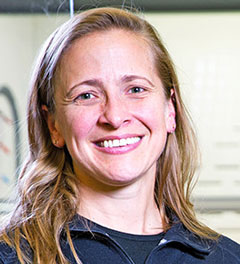Date: Tuesday, March 12, 2019
Time: 11:00 AM
Talk Title: Molecular Foundry/ALS Joint Seminar: Phosphorus from Wastewater: A Systems Approach to Electrochemical Nutrient Recovery
Location: Building 66 Auditorium

Abstract:
In our research, we are generally interested in understanding how an improved understanding of materials chemistry in aqueous systems can help to better engineer treatment solutions, as well as think about alternatives to traditional treatment approaches. In this talk, I will discuss our current research project focused on phosphate recovery from wastewaters through electrochemistry within the overall idea of changing municipal wastewater treatment from primarily contaminant removal to include resource recovery.
My talk will discuss our interdisciplinary approach to phosphate and ammonia recycling from wastewater and will include initial results from our first year of working together, including results on electrochemical recovery of struvite (magnesium ammonium phosphate), design and scale up of struvite production, soil and row crop studies on recycled versus commercial fertilizer products, protein engineering to facilitate struvite precipitation kinetics, and initial life cycle analysis and technoeconomic models that include struvite recovery as a phosphate recycling approach.
Biography:
Lauren received her B.S. in Chemical Engineering from the University of Michigan, Ann Arbor, in 2001 and then spent several years working abroad in France and Switzerland. Subsequently, she worked in Boston for a pharmaceutical start-up company before attending graduate school at the University of Texas at Austin. She received her M.S. in Environmental Engineering in 2006 and her Ph.D. in Chemical Engineering in 2009, where she focused on understanding the precipitation of scaling salts during reverse osmosis membrane desalination. Lauren then held a National Research Council postdoctoral fellowship at the National Institute of Standards & Technology (NIST) from 2009 – 2011, with a focus on iron nanoparticle synthesis and characterization for water treatment applications. She continued at NIST as a staff scientist and led the Engineered Nanoparticle Systems Project for four years, before joining the faculty of the Ralph E. Martin Department of Chemical Engineering as an Assistant Professor in December 2015. Her research group is interested in the development and characterization of nanoparticles and nanostructured materials for water treatment, electrochemical energy conversion, and chemical conversion applications.

